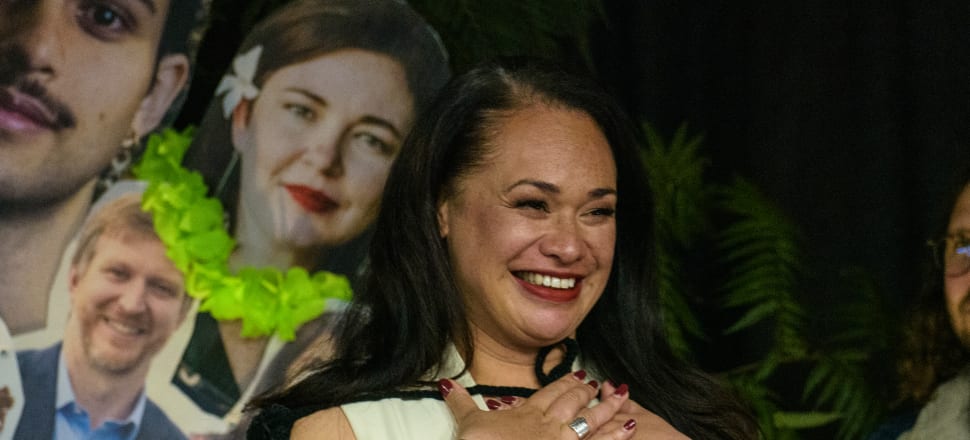
New Wellington Mayor Tory Whanau says she'll put an end to council bickering and in-fighting - a task made easier by the left-wing majority she now presides over, Marc Daalder reports
Green Party MPs and supporters jubilantly celebrated Tory Whanau's victory in the Wellington mayoral race on Saturday. In a central city party, they feted Whanau and other successful Green candidates - two on Wellington City Council and four on the regional council.
“It’s a dream come true,” Whanau told Newsroom on Saturday. “I feel hope for the city, because people have chosen to elect someone who wants progressive policies, they want to be able to connect to the mayor, they want them to be accessible.”
The triumph was certainly unexpected. Whanau spent the campaign denying rumours she was only running for Wellington's top job as a way to boost her profile for an eventual bid for MP on the Green Party list. Within her campaign, however, few expected she'd win so decisively.
Labour MP Paul Eagle, the pundits' frontrunner, foundered. He came in fourth, behind the incumbent, centre-right Andy Foster, and behind independent council candidate Ray Chung. The three-way race which had commentators scratching their heads turns out to have been a four-way race - or maybe just a one-sided blowout.
Preliminary results show Whanau received 24,000 first-place votes, more than double the 10,000 accrued by Eagle and Foster. After everything was done and dusted, she led second-place Foster by a whopping 16,426 votes. That's a far cry from the 62 vote margin by which Foster scraped into office in 2019.
The result also bucks the nationwide trend, which saw right-wing candidates triumph in major cities and dominate many councils.
Whanau told Newsroom that Wellington has always leaned left, so the fact the mayor is left-wing isn't a surprise. Why she triumphed over Eagle, however, was because she successfully mobilised those voters.
"My campaign mobilised them. It's the grassroots thing. We got them out to vote, they were like, 'Yep, this is my jam' - and we hit the numbers."
She will also have been aided by the fact that the Wellington mayoral race was more of a referendum on leadership skills than a serious contest of ideas. Whanau is the first to admit that, on the big picture stuff, there wasn't much daylight between her views and those of her opponents.
Instead, the candidates ran on their ability to wrangle council bickering and in-fighting and restore trust in local government in Wellington.
From that perspective, Foster was always somewhat doomed. While he insisted the council was stacked against him from the moment he started, a $30,000 leadership seminar at a luxury Queenstown resort and an internal review of dysfunction gave the voting public the perception that Foster was at least partly to blame.
Whanau and Eagle spent most of the race attempting to persuade constituents they could succeed where Foster had failed.
Whanau touted her history as chief of staff for the Green Party during the tumultuous days of the Labour/NZ First/Greens government. Compared to the challenge of getting James Shaw, Winston Peters and Jacinda Ardern on the same page, local councillors would be no sweat.
Eagle focused on a "back to basics" campaign run on pipes, public transport and parks. But it's possible that the revelations he was giving campaign advice to independent councillors running against Labour candidates may have stunk of the same old council politicking. After all, Eagle was a Wellington City councillor once upon a time too.
The new mayor says she's a fresh start for the city and that unity is her number one priority over the next couple of months.
"The first few months is definitely that unity piece and getting our public to trust our council," she said. "I'm keen to work on a public engagement transformation project to improve our consultation process so people really buy into it. I know it's not the sexiest thing in the world but I think it will build a great foundation to make good decisions that our city will trust."
Unity will be made easier by the political makeup of the new council. Out of 15 elected seats, seven have gone to Labour and Green councillors. Two of the independents are also former Greens, making for a clear left-wing majority when Whanau's own vote is included.
"I will treat them all exactly the same, including the Labour/Greens," she said. "I'm going to be very fair with everyone else. All I ask is we treat everyone with respect."
Whanau also said she will create a strategic document outlining her ambitions for the role, with specific performance indicators included. This would allow the public to hold the council accountable for making meaningful progress.
There's certainly a lot for the incoming council to do.
Major decisions around the multibillion dollar Let's Get Wellington Moving transport project will be made this term. A new district plan covering (among other things) housing intensification, the implementation of the Government's Three Waters reforms and the response to the review of local government will all also need to be finalised.
The new head of the council table may well set the direction for the capital for decades to come.







